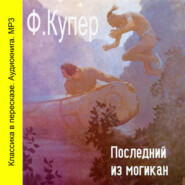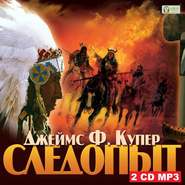По всем вопросам обращайтесь на: info@litportal.ru
(©) 2003-2024.
✖
Mercedes of Castile: or, The Voyage to Cathay
Настройки чтения
Размер шрифта
Высота строк
Поля
"Then, there was Monsieur de Guienne, the brother of King Louis of France," she resumed, affecting contempt in her manner; "he would fain become the husband of the future Queen of Castile! But even our most unworthy Castilians soon saw the unfitness of that union. Their pride was unwilling to run the chance of becoming a fief of France."
"That misfortune could never have befallen our beloved Castile," interrupted Isabella with dignity; "had I espoused the King of France himself, he would have learned to respect me as the Queen Proprietor of this ancient realm, and not have looked upon me as a subject."
"Then, Señora," continued Beatriz, looking up into Isabella's face, and laughing – "was your own royal kinsman, Don Ricardo of Gloucester; he that they say was born with teeth, and who carries already a burthen so heavy on his back, that he may well thank his patron saint that he is not also to be loaded with the affairs of Castile."[1 - Note – The authorities differ as to which of the English princes was the suitor of Isabella; Edward IV. himself, Clarence, or Richard. Isabella was the grand-daughter of Catherine of Lancaster, who was a daughter of John of Gaunt.]
"Thy tongue runneth riot, Beatriz. They tell me that Don Ricardo is a noble and aspiring prince; that he is, one day, likely to wed some princess, whose merit may well console him for his failure in Castile. But what more hast thou to offer concerning my suitors?"
"Nay, what more can I say, my beloved mistress? We have now reached Don Fernando, literally the first, as he proveth to be the last, and as we know him to be, the best of them all."
"I think I have been guided by the motives that become my birth and future hopes, in choosing Don Ferdinand," said Isabella, meekly, though she was uneasy in spite of her royal views of matrimony; "since nothing can so much tend to the peace of our dear kingdom, and to the success of the great cause of Christianity, as to unite Castile and Aragon under one crown."
"By uniting their sovereigns in holy wedlock," returned Beatriz, with respectful gravity, though a smile again struggled around her pouting lips. "What if Don Fernando is the most youthful, the handsomest, the most valiant, and the most agreeable prince in Christendom, it is no fault of yours, since you did not make him, but have only accepted him for a husband!"
"Nay, this exceedeth discretion and respect, my good Beatriz," returned Isabella, affecting to frown, even while she blushed deeply at her own emotions, and looked gratified at the praises of her betrothed. "Thou knowest that I have never beheld my cousin, the King of Sicily."
"Very true, Señora; but Father Alonso de Coca hath – and a surer eye, or truer tongue than his, do not exist in Castile."
"Beatriz, I pardon thy license, however unjust and unseemly, because I know thou lovest me, and lookest rather at mine own happiness, than at that of my people," said the princess, the effect of whose gravity now was not diminished by any betrayal of natural feminine weakness – for she felt slightly offended. "Thou knowest, or ought'st to know, that a maiden of royal birth is bound principally to consult the interests of the state, in bestowing her hand, and that the idle fancies of village girls have little in common with her duties. Nay, what virgin of noble extraction, like thyself, even, would dream of aught else than of submitting to the counsel of her family, in taking a husband? If I have selected Don Fernando of Aragon, from among many princes, it is, doubtless, because the alliance is more suited to the interests of Castile, than any other that hath offered. Thou seest, Beatriz, that the Castilians and the Aragonese spring from the same source, and have the same habits and prejudices. They speak the same language" —
"Nay, dearest lady, do not confound the pure Castilian with the dialect of the mountains!"
"Well, have thy fling, wayward one, if thou wilt; but we can easier teach the nobles of Aragon our purer Spanish, than we can teach it to the Gaul. Then, Don Fernando is of my own race; the House of Trastamara cometh of Castile and her monarchs, and we may at least hope that the King of Sicily will be able to make himself understood."
"If he could not, he were no true knight! The man whose tongue should fail him, when the stake was a royal maiden of a beauty surpassing that of the dawn – of an excellence that already touches on heaven – of a crown" —
"Girl, girl, thy tongue is getting the mastery of thee – such discourse ill befitteth thee and me."
"And yet, Doña Ysabel, my tongue is close bound to my heart."
"I do believe thee, my good Beatriz; but we should bethink us both of our last shrivings, and of the ghostly counsel that we then received. Such nattering discourse seemeth light, when we remember our manifold transgressions, and our many occasions for forgiveness. As for this marriage, I would have thee think that it has been contracted on my part, with the considerations and motives of a princess, and not through any light indulgence of my fancies. Thou knowest that I have never beheld Don Fernando, and that he hath never even looked upon me."
"Assuredly, dearest lady and honored mistress, all this I know, and see, and believe; and I also agree that it were unseemly and little befitting her birth, for even a noble maiden to contract the all-important obligations of marriage, with no better motive than the light impulses of a country wench. Nothing is more just than that we are alike bound to consult our own dignity, and the wishes of kinsmen and friends; and that our duty, and the habits of piety and submission in which we have been reared, are better pledges for our connubial affection than any caprices of a girlish imagination. Still, my honored lady, it is most fortunate that your high obligations point to one as youthful, brave, noble, and chivalrous, as is the King of Sicily, as we well know, by Father Alonso's representations, to be the fact; and that all my friends unite in saying that Don Andres de Cabrera, madcap and silly as he is, will make an exceedingly excellent husband for Beatriz de Bobadilla!"
Isabella, habitually dignified and reserved as she was, had her confidants and her moments for unbending; and Beatriz was the principal among the former, while the present instant was one of the latter. She smiled, therefore, at this sally; and parting, with her own fair hand, the dark locks on the brow of her friend, she regarded her much as the mother regards her child, when sudden passages of tenderness come over the heart.
"If madcap should wed madcap, thy friends, at least, have judged rightly," answered the princess. Then, pausing an instant, as if in deep thought, she continued in a graver manner, though modesty shone in her tell-tale complexion, and the sensibility that beamed in her eyes betrayed that she now felt more as a woman than as a future queen bent only on the happiness of her people: "As this interview draweth near, I suffer an embarrassment I had not thought it easy to inflict on an Infanta of Castile. To thee, my faithful Beatriz, I will acknowledge, that were the King of Sicily as old as Don Alfonso of Portugal, or were he as effeminate and unmanly as Monsieur of Guienne; were he, in sooth, less engaging and young, I should feel less embarrassment in meeting him, than I now experience."
"This is passing strange, Señora! Now, I will confess that I would not willingly abate in Don Andres, one hour of his life, which has been sufficiently long as it is; one grace of his person, if indeed the honest cavalier hath any to boast of; or one single perfection of either body or mind."
"Thy case is not mine, Beatriz. Thou knowest the Marquis of Moya; hast listened to his discourse, and art accustomed to his praises and his admiration."
"Holy St. Iago of Spain! Do not distrust any thing, Señora, on account of unfamiliarity with such matters – for, of all learning, it is easiest to learn to relish praise and admiration!"
"True, daughter" – (for so Isabella often termed her friend, though her junior: in later life, and after the princess had become a queen, this, indeed, was her usual term of endearment) – "true, daughter, when praise and admiration are freely given and fairly merited. But I distrust, myself, my claims to be thus viewed, and the feelings with which Don Fernando may first behold me. I know – nay, I feel him to be graceful, and noble, and valiant, and generous, and good; comely to the eye, and strict of duty to our holy religion; as illustrious in qualities as in birth; and I tremble to think of my own unsuitableness to be his bride and queen."
"God's Justice! – I should like to meet the impudent Aragonese noble that would dare to hint as much as this! If Don Fernando is noble, are you not nobler, Señora, as coming of the senior branch of the same house; if he is young, are you not equally so; if he is wise, are you not wiser; if he is comely, are you not more of an angel than a woman; if he is valiant, are you not virtuous; if he is graceful, are you not grace itself; if he is generous, are you not good, and what is more, are you not the very soul of generosity; if he is strict of duty in matters of our holy religion, are you not an angel?"
"Good sooth – good sooth – Beatriz, thou art a comforter! I could reprove thee for this idle tongue, but I know thee honest."
"This is no more than that deep modesty, honored mistress, which ever maketh you quicker to see the merits of others, than to perceive your own. Let Don Fernando look to it! Though he come in all the pomp and glory of his many crowns, I warrant you we find him a royal maiden in Castile, who shall abash him and rebuke his vanity, even while she appears before him in the sweet guise of her own meek nature!"
"I have said naught of Don Fernando's vanity, Beatriz – nor do I esteem him in the least inclined to so weak a feeling; and as for pomp, we well know that gold no more abounds at Zaragosa than at Valladolid, albeit he hath many crowns, in possession, and in reserve. Notwithstanding all thy foolish but friendly tongue hath uttered, I distrust myself, and not the King of Sicily. Methinks I could meet any other prince in Christendom with indifference – or, at least, as becometh my rank and sex; but I confess, I tremble at the thought of encountering the eyes and opinions of my noble cousin."
Beatriz listened with interest; and when her royal mistress ceased speaking, she kissed her hand affectionately, and then pressed it to her heart.
"Let Don Fernando tremble, rather, Señora, at encountering yours," she answered.
"Nay, Beatriz, we know that he hath nothing to dread, for report speaketh but too favorably of him. But, why linger here in doubt and apprehension, when the staff on which it is my duty to lean, is ready to receive its burthen: Father Alonso doubtless waiteth for us, and we will now join him."
The princess and her friend now repaired to the chapel of the palace, where her confessor celebrated the daily mass. The self-distrust which disturbed the feelings of the modest Isabella was appeased by the holy rites, or, rather, it took refuge on that rock where she was accustomed to place all her troubles, with her sins. As the little assemblage left the chapel, one, hot with haste, arrived with the expected, but still doubted tidings, that the King of Sicily had reached Dueñas in safety, and that, as he was now in the very centre of his supporters, there could no longer be any reasonable distrust of the speedy celebration of the contemplated marriage.
Isabella was much overcome with this news, and required more than usual of the care of Beatriz de Bobadilla, to restore her to that sweet serenity of mind and air, which ordinarily rendered her presence as attractive as it was commanding. An hour or two spent in meditation and prayer, however, finally produced a gentle calm in her feelings, and these two friends were again alone, in the very apartment where we first introduced them to the reader.
"Hast thou seen Don Andres de Cabrera?" demanded the princess, taking a hand from a brow which had been often pressed in a sort of bewildered recollection.
Beatriz de Bobadilla blushed – and then she laughed outright, with a freedom that the long-established affection of her mistress did not rebuke.
"For a youth of thirty, and a cavalier well hacked in the wars of the Moors, Don Andres hath a nimble foot," she answered. "He brought hither the tidings of the arrival; and with it he brought his own delightful person, to show it was no lie. For one so experienced, he hath a strong propensity to talk; and so, in sooth, while you, my honored mistress, would be in your closet alone, I could but listen to all the marvels of the journey. It seems, Señora, that they did not reach Dueñas any too soon; for the only purse among them was mislaid, or blown away by the wind on account of its lightness."
"I trust this accident hath been repaired. Few of the house of Trastamara have much gold at this trying moment, and yet none are wont to be entirely without it."
"Don Andres is neither beggar nor miser. He is now in our Castile, where I doubt not he is familiar with the Jews and money-lenders; as these last must know the full value of his lands, the King of Sicily will not want. I hear, too, that the Count of Treviño hath conducted nobly with him."
"It shall be well for the Count of Treviño that he hath had this liberality. But, Beatriz, bring forth the writing materials; it is meet that I, at once, acquaint Don Enriquez with this event, and with my purpose of marriage."
"Nay, dearest mistress, this is out of all rule. When a maiden, gentle or simple, intendeth marriage against her kinsmen's wishes, it is the way to wed first, and to write the letter and ask the blessing when the evil is done."
"Go to, light-of-speech! Thou hast spoken; now bring the pens and paper. The king is not only my lord and sovereign, but he is my nearest of kin, and should be my father."
"And Doña Joanna of Portugal, his royal consort, and our illustrious queen, should be your mother; and a fitting guide would she be to any modest virgin! No – no – my beloved mistress; your royal mother was the Doña Isabella of Portugal – and a very different princess was she from this, her wanton niece."
"Thou givest thyself too much license, Doña Beatriz, and forgettest my request. I desire to write to my brother the king."
It was so seldom that Isabella spoke sternly, that her friend started, and the tears rushed to her eyes at this rebuke; but she procured the writing materials, before she presumed to look into Isabella's face, in order to ascertain if she were really angered. There all was beautiful serenity again; and the Lady of Bobadilla, perceiving that her mistress's mind was altogether occupied with the matter before her, and that she had already forgotten her displeasure, chose to make no further allusion to the subject.
Isabella now wrote her celebrated letter, in which she appeared to forget all her natural timidity, and to speak solely as a princess. By the treaty of Toros de Guisando, in which, setting aside the claims of Joanna of Portugal's daughter, she had been recognized as the heiress of the throne, it had been stipulated that she should not marry without the king's consent; and she now apologized for the step she was about to take, on the substantial plea that her enemies had disregarded the solemn compact entered into not to urge her into any union that was unsuitable or disagreeable to herself. She then alluded to the political advantages that would follow the union of the crowns of Castile and Aragon, and solicited the king's approbation of the step she was about to take. This letter, after having been submitted to John de Vivero, and others of her council, was dispatched by a special messenger – after which act the arrangements necessary as preliminaries to a meeting between the betrothed were entered into. Castilian etiquette was proverbial, even in that age; and the discussion led to a proposal that Isabella rejected with her usual modesty and discretion.
"It seemeth to me," said John de Vivero, "that this alliance should not take place without some admission, on the part of Don Fernando, of the inferiority of Aragon to our own Castile. The house of the latter kingdom is but a junior branch of the reigning House of Castile, and the former territory of old was admitted to have a dependency on the latter."
This proposition was much applauded, until the beautiful and natural sentiments of the princess, herself, interposed to expose its weakness and its deformities.
"It is doubtless true," she said, "that Don Juan of Aragon is the son of the younger brother of my royal grandfather; but he is none the less a king. Nay, besides his crown of Aragon – a country, if thou wilt, which is inferior to Castile – he hath those of Naples and Sicily; not to speak of Navarre, over which he ruleth, although it may not be with too much right. Don Fernando even weareth the crown of Sicily, by the renunciation of Don Juan; and shall he, a crowned sovereign, make concessions to one who is barely a princess, and whom it may never please God to conduct to a throne? Moreover, Don John of Vivero, I beseech thee to remember the errand that bringeth the King of Sicily to Valladolid. Both he and I have two parts to perform, and two characters to maintain – those of prince and princess, and those of Christians wedded and bound by holy marriage ties. It would ill become one that is about to take on herself the duties and obligations of a wife, to begin the intercourse with exactions that should be humiliating to the pride and self-respect of her lord. Aragon may truly be an inferior realm to Castile – but Ferdinand of Aragon is even now every way the equal of Isabella of Castile; and when he shall receive my vows, and, with them, my duty and my affections" – Isabella's color deepened, and her mild eye lighted with a sort of holy enthusiasm – "as befitteth a woman, though an infidel, he would become, in some particulars, my superior. Let me, then, hear no more of this; for it could not nearly as much pain Don Fernando to make the concessions ye require, as it paineth me to hear of them."
CHAPTER III
"Nice customs curt'sy to great kings. Dear Kate, you and I cannot be confined within the weak list of a country's fashion. We are the makers of manners; and the liberty that follows our places, stops the mouths of all fault-finders." – Henry V.
Notwithstanding her high resolution, habitual firmness, and a serenity of mind, that seemed to pervade the moral system of Isabella, like a deep, quiet current of enthusiasm, but which it were truer to assign to the high and fixed principles that guided all her actions, her heart beat tumultuously, and her native reserve, which almost amounted to shyness, troubled her sorely, as the hour arrived when she was first to behold the prince she had accepted for a husband. Castilian etiquette, no less than the magnitude of the political interests involved in the intended union, had drawn out the preliminary negotiations several days; the bridegroom being left, all that time, to curb his impatience to behold the princess, as best he might.

















